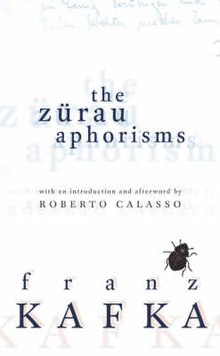The Zürau Aphorisms
 |
|
| Author | Franz Kafka |
|---|---|
| Country | Germany |
| Language | German |
|
Publication date
|
1931 |
| Media type | |
The Zürau Aphorisms (German: Die Zürauer Aphorismen) are 109 aphorisms of Franz Kafka, written from September 1917 to April 1918 and published by his friend Max Brod in 1931, after his death. They are selected from his writing in Zürau in West Bohemia (now Siřem in the community of Blšany) where he stayed with his sister Ottla, suffering from tuberculosis. His friend Max Brod titled the book "Betrachtungen über Sünde, Hoffnung, Leid und den wahren Weg" (Reflections on Sin, Hope, Suffering, and the True Way).
After he was diagnosed with tuberculosis in August 1917, in order to recover, Kafka moved for a few months to the Bohemian village of Zürau, where his sister Ottla worked on the farm of her brother-in-law Hermann. He felt very comfortable there and later described his time there as perhaps the best in his life, probably because he had no responsibilities to work, parents and women.
Kafka had decided not to do literary work there. However, he kept diaries and "Oktavhefte". From the notes in these books Kafka extracted 109 numbered pieces of text on "Zettel", single pieces of paper in no given order. These aphorisms were first published in 1931 by Kiepenheuer & Witsch, under the title Brod had chosen: "Betrachtungen über Sünde, Hoffnung, Leid und den wahren Weg" (Reflections on Sin, Hope, Suffering, and the True Way).
The aphorisms are strict reflections on metaphysical topics, dealing with good and evil, truth and falsehood, alienation and redemption, death and paradise. They are Kafka's only texts dealing directly with theological issues. The philosophical reflections are inspired by the world of ideas of Schopenhauer, namely Die Welt als Wille und Vorstellung, as well as Kierkegaard's interpretations of the fall of man.
The individual aphorisms are not related to each other; some have a narrative character, others present images or parables.
...
Wikipedia
